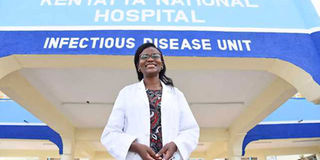Covid-19: Old age, co-morbidities and rise in cases increase fatalities

Dr Loice Achieng Ombajo at the Kenyatta National Hospital Infectious Disease Unit on May 3, 2020. She is the principal investigator in the study. PHOTO | EVANS HABIL | NATION MEDIA GROUP
What you need to know:
- Some have died at home (making it difficult to know exactly what killed them).
- Many die very soon after arrival in hospital, they present with very severe disease.
- Most of those dying are older people who also happen to have co-morbidities.
An interview with Dr Loice Achieng Ombajo, a senior lecturer in the Department of Medicine at the University of Nairobi.
Why so many deaths suddenly?
The number of deaths is a proportion of the number of infections, so as the infections increase, we can also expect to see the number of deaths rising. Also, initial infections were mainly young people who had returned to the country from travel (these were mostly asymptomatic) now we’re getting older people getting infected through community transmission, as well as people with co-morbidities.
These are more at risk of death. And the numbers are set to rise more if the health systems get overwhelmed by sick people. This will mean more people will die because they’re unable to get the required help.
How are these deaths happening? What is killing them?
Some have died at home (making it difficult to know exactly what killed them). Many die very soon after arrival in hospital, they present with very severe disease. Most of those dying are older people who also happen to have co-morbidities.
This is why it’s very important to shield older people, even if we open up the country (to remove travel restrictions and allow religious gatherings). People have to think about responsibility for the lives of older people. However, there has been a death of a patient who had no co-morbidity. Also, by the time a patient is so sick as to require ICU or a ventilator, they are at a very high risk of dying, usually 50-80 per cent risk of mortality. Most of those who have died had severe disease. Patients who have trouble breathing at the time of admission deteriorate very fast. Also at risk are patients with lung disease, smokers and older men.
Why are men more affected? More men than women dying?
This phenomenon is being seen in most countries. It’s only in South Africa where more women than men have died. Possibly this is because of the high number of women with obesity. In Kenya, men account for 77 per cent of deaths, and women 23 per cent. The reasons are not yet well understood. We’ve also recorded two mortalities of children - One had significant co-morbidities and had been in and out of hospital several times.
What are the greatest risk factors?
Old age and co-morbidities such as heart disease and diabetes.
Why is diabetes such a high risk factor?
When a person has diabetes, they are always at high risk of infections, especially when the diabetes is poorly controlled. This means their immunity is not good and they get infections more frequently and these are more severe. We also see a bit of HIV, but in Kenya, where about 1.5 million people have HIV, they're mostly on treatment, meaning the virus is suppressed and their immunity is good.
What are the common symptoms of Covid-19 that are presenting in the patients?
Chest problems, such as cough and fever; and sore throat and headache. For severe sickness, there’s difficulty in breathing, and when you measure the oxygen saturation in their blood, it’s less than the normal levels of 94-100 per cent. In which case you need to give them additional oxygen and nurse them in a position that allows better oxygen intake, and if this doesn't work, they would require a ventilator.
There have been suggestions that, since we know who are most at risk of dying, we should isolate them and protect them, but get on with normal life. What would you say to this?
Unfortunately, we don't always know who'll end up with severe disease. In our society, we live with people who are at risk but it would be difficult to isolate them. Much older people in society need to be shielded. But we also have situations where grandmothers take care of their grandchildren, how do you isolate these? The ministry has said the hospitals are filling up, and we may have nowhere to admit Covid-19 patients.
What can be done about this?
Taking care of people who are not sick in hospitals is very expensive. When someone has no symptoms, they don’t need a doctor to stop by their hospital bed just to ask them how they’re doing. However, our strategy was to admit in hospital every confirmed infected person to slow down the spread. But we should now consider having those who’re not sick isolate at home, or come up with isolation facilities outside hospitals so that beds are left to the sick.
The President talked about the forecast of deaths was depending on the percentage to which he relaxed the rules. Supposing the rules remain in place, what is the forecast?
A total of 26,000 deaths over the next one year.




